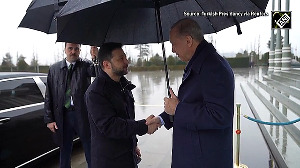In a veiled message to the Left parties, Prime Minister's Special Envoy Shyam Saran on Monday said India would not be able to have civil nuclear trade with the international community without the United States taking the 'lead on our behalf'.
Saran, while underlining that the Indo-US civil nuclear deal had nothing that would impact India's military programme, said, "Frankly, I do not think that we could have secured any better safeguards for our interests in the deal. While there has been intense focus on the Indo-US bilateral agreement, much of the commentary on the subject has lost sight of the multilateral regime whose adjustment in favour of India is what we are aiming at".
"Our objective is to enable India to have a wide choice of partners in pursuing nuclear commerce and high technology trade. But we cannot attain this objective without the US taking the lead on our behalf," he said.
Noting that Russia and France are friendly to India and extremely keen to engage in nuclear commerce with it, Saran said, "However, there should be no doubt that neither they nor others will make an exception for India unilaterally unless the Nuclear Suppliers Group adjusts its guidelines in the same manner as the US is prepared to do".
Talking about opposition by the Left parties to the growing ties with Washington, the Prime Minister's envoy said, "Whatever be the reservations that have been expressed about our relations with the US, no other friendly country, member of the NSG has the necessary standing to lead the process of opening up the existing multilateral regime to accommodate India".
Saran, a former foreign secretary, insisted that the US is in a 'unique position' because it initiated the restrictive regimes against India in the first place and also because it remains the 'pre-emiment source of new sensitive technologies'.
Without directly referring to the opposition by Left parties, he said even if the 'controversies at home were somehow resolved', the process the government is engaged in 'will face several challenges ahead'.
The Left parties, which extend crucial support to the United Progressive Alliance government, have been opposing growing relations with the US, particularly the civil nuclear deal.
They, however, have no problems with India pursuing nuclear cooperation with other countries like Russia, France and Germany. Saran noted that finalisation of the India-specific safeguards agreement with International Atomic Energy Agency was still awaited and after that, the NSG will have to change guidelines to allow the world community to have nuclear trade with India.
"It is our expectation that there would be a fairly simple and clean exemption from these guidelines, without any conditions or even expectations regarding India's conduct in future," he said.
Defending the nuclear deal with the US, he said, "The initiative of the Prime Minister represents a significant and unprecedented effort to expand India's choices, create a more conducive and supportive international environment to advance India's developmental goals and mark the emergence of India as a major global player in a rapidly transforming international landscape."






 © 2025
© 2025